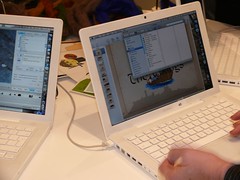E Is For Everything -- But Why?
 Is the 'E' necessary?There is an unfortunate tendency for e-learning evangelists to try and come up with as many e-words as possible when promoting the benefits of e-learning. Why?
Is the 'E' necessary?There is an unfortunate tendency for e-learning evangelists to try and come up with as many e-words as possible when promoting the benefits of e-learning. Why?
I suppose the idea is to generate excitement, and to energise one’s colleagues. But to my mind, this is mere gimmickry.
I’ve seen it done with the 'C' in ICT as well. That stands for 'communication' or 'communications', but I’ve known people to embellish and complement it with 'collaborate', 'co-operation' and the like.
(Curiously, I have never seen it done with 'd', as in 'digital', or any other letter.)
If that is all there was to it, this tendency would be merely annoying. However, I believe it has a subtle -- but real – derogatory effect, in two ways.
Firstly, just as it is often the case that a piece of writing is diminished in direct proportion to the number of adjectives used, so is the authority of a discipline lessened as more and more attributes are generated for it. It seems to denote a certain lack of confidence: you don't see geography teachers babbling on about how good, great or gritty their subject is; you don't hear historians trying to convince people that their area of study brings happiness, or that it reduces harm or hubris.
To quote from Hamlet, "The lady doth protest too much, methinks".
Secondly, and worse, it can actually do some positive harm. As long as the myth is propagated that e-learning is different to learning, or that an e-portfolio is fundamentally different to a portfolio, some teachers and their principals will quite happily continue as if the e-revolution has nothing to do with them. Worse, concerns over e-safety could easily mask the fact that all teachers should feel responsible for children’s safety, and that there is not a subset of safety that can be delegated to the ICT staff.
As far as I am concerned, the sooner we drop the 'e' from everything, the better.
An earlier version of this article first appeared on 29 July 2009.
![Reblog this post [with Zemanta]](http://img.zemanta.com/reblog_b.png?x-id=8a0c5167-ea8f-430d-ad1d-4cb83ef4a1a1)